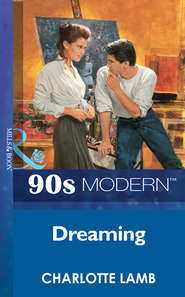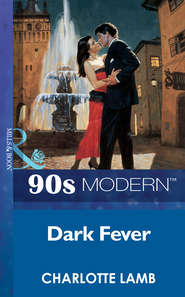По всем вопросам обращайтесь на: info@litportal.ru
(©) 2003-2025.
✖
Secret Obsession
Автор
Год написания книги
2018
Настройки чтения
Размер шрифта
Высота строк
Поля
It had been one of the biggest shocks of her life. She had been at work, had picked up the phone expecting it to be a business call and heard her uncle’s voice with a start of alarm. She had known it couldn’t be good news; he wouldn’t ring her at work for that.
‘I came as soon as I could,’ she added. She couldn’t get over the blankness of his face. The emptiness. His features unmoving, unchanging.
This is how he would look if he were dead, Nerissa thought, and her body winced in pain. Maybe he is dying? If they switched off this life-support machine would he die?
‘Darling, wake up!’ Urgency possessed her. She was afraid to touch his face, afraid of jarring his head, so she put her face down against his hand and kissed it, held it to her cheek. She had half expected his skin to be cold but it was warm; she put her lips against his inner wrist and felt the blood pumping sluggishly there, in the blue vein which she could see threading beneath the skin.
‘Wake up, Philip!’ she whispered against this one sign of Me in him.
There was no response, of course; she didn’t expect any. He had lain like this ever since the car crash in which he had suffered head injuries necessitating surgery—surgery which had physically relieved the pressure on his brain, her uncle had told her, but had left him like this, in a deep coma.
She couldn’t bear the idea of Philip dying. They had grown up together, as close as twins. For most of her life Philip had been the most important person in the world to her.
Behind her she heard the door open and sat up quickly, still holding his hand.
‘You must be his cousin,’ said a friendly voice and she turned to see a nurse behind her. ‘Hello, I’m his day special—I look after him during the day. He has someone else at night. I’m Staff Nurse Courtney.’
Nerissa smiled shyly at her. ‘Hello.’
‘How do you think he’s looking?’ The shrewd brown eyes watched her. ‘Bit of a shock, I expect, seeing him like this, but his condition has stabilised; there’s been no deterioration over the last couple of days.’
‘Does that mean he’s getting better?’ Nerissa asked hopefully, and saw the other girl hesitate.
‘Not exactly. It just means he isn’t getting any worse, which, believe me, is a hopeful sign.’
Nerissa’s face fell and Nurse Courtney quickly added, ‘It could mean he is going to take a turn for the better any minute. His mother’s doing a wonderful job and now you’re here, too. Keep talking to him; he needs all the stimulation he can get, anything that keeps jogging his brain.’
She left a few minutes later and Nerissa sat down beside Philip again and took his hand. ‘Do you like her?’ she asked him conversationally. ‘She has a very nice face—it matches her voice. I think you’ll like her. She’s the one who shaves you every day, she says. She’s good at it, too; you couldn’t do better yourself.’
His parents came back while she was telling him that it had started to rain. ‘Typical—it was wonderful weather in London, but I get back here and down comes the rain! It’s a wonder we don’t all have gills and fins, the rain we get up here.’
John Thornton laughed behind her and she glanced round. ‘Oh, your mum and dad are back, Philip.’
They sat down near by and talked to her, spoke to Philip as well, all the time, as if he were awake, so that after a while it seemed quite natural to Nerissa to do the same. She almost began to expect him to chime in occasionally—argue about something, laugh.
It had got dark by the time Grace Thornton looked at her watch and said, ‘I think you should take Nerissa home for some tea, John. She’s had a long journey today; she’ll need a good night’s rest.’
Nerissa couldn’t deny she was tired—her eyelids were heavy and she had to suppress yawns all the time—but she protested. ‘I went to stay, in case he wakes up!’
‘You can’t stay here all the time,’ said his mother. ‘It’s exhausting. I should know; I’ve done it for hours at a stretch. But if you’re to be any use to Philip you need to be fresh, and that means getting sleep. I shall be home later. I like to see him tucked up for the night, then I go home. We’ll come back tomorrow morning.’
Nerissa fell asleep in the car during the drive through the hills to her uncle’s farm. She woke up only when she heard dogs barking, and realised that the car had stopped in the farmyard.
‘I thought I was going to have to carry you up to bed!’ John Thornton said cheerfully. ‘Grace was right. You’re dead on your feet.’
‘I think I’ll go straight to bed,’ she admitted, yawning. ‘I’m not hungry.’
‘You said that before,’ he said, unlocking the solid oak front door and switching on the light in the small, panelled hall. ‘Look, you get undressed and hop into bed and I’ll bring you some hot chocolate and a sandwich—how’s that?’
She hugged him. ‘Oh, I’ve missed you, both of you, in London! It’s great to be home.’
She caught the flash of sadness in his eyes, and knew what he was thinking. She couldn’t let him say anything, though, so she ran up the old, creaking oak stairs, her nostrils filling with the familiar fragrance from her childhood—beeswax-polished furniture and stair-treads, home-made potpourri from the roses and lavender in the garden.
This was not a large house but a solid, well-made one, built of local stone and flint, carefully placed to shut out the prevailing winds on these Northumbrian hills, sheltered on all sides by ancient trees and high stone walls. Lantern Farm had been in one family since it was built in the seventeenth century. The Thorntons were not rich but they had always lived comfortably, running their sheep on the pastures above the house, keeping a few pigs, geese, horses and hens to supplement their income.
The furniture was all old, worn, shabby and wellkept. It shone with polish. Any tears in curtains and upholstery were neatly darned and there was rarely need to buy anything since the attics were well-stocked with household objects which were often brought back into use when a fashion returned after a century or so.
There were four bedrooms. Nerissa had always had a small one at the side of the house, overlooking an orchard. She undressed and climbed into bed, shivering a little because it was so much colder than her centrally heated home in London. At Lantern Farm they still kept wood fires, and none had been lit in this room since she’d left.
The faded tapestry curtains were threadbare; the wind blew through the lattice panes and rattled the door. On the bed lay an old patchwork quilt, made by John Thornton’s mother when she was first married from dozens of little cut-up pieces from old cotton shirts, dresses, curtains. The colours had faded but Nerissa thought it was beautiful. She stroked it, following the pattern, the diamonds and circles interlocking, and then she looked around the room, feeling very strange; it was like being caught in a time warp, spun back to her teens, to a very different Nerissa.
Her uncle arrived with a tray bearing a plate of tiny, finger sandwiches—brown bread leafed with ham and salad—a glass of water and a mug of hot chocolate. Under his arm he carried a hot-water bottle in a furry case which he handed her first.
‘Oh, thank you,’ she said gratefully, pushing it under her covers and feeling warmth begin to circulate around her frozen feet and legs.
‘I should have lit a fire in here—shall I light one now?’
‘No, I’ll be fine,’ she said, and bit one of the tiny sandwiches. ‘Mmm, that’s delicious. You remembered, I love ham.’
‘Always did,’ he said, beaming. ‘Goodnight, then, love. If there’s anything you want, give me a shout.’
Ten minutes later the light was out and Nerissa was already half asleep.
It was strange to wake up in that house again. Strange to put on jeans and a thick, warm sweater and go out into the crisp autumn dawn where the shouting wind caught her black hair and blew it around her like a banner. She ran, startling horses in the pasture below the house. Climbing the wall and jumping down, she hunted for new mushrooms in the long grass where they had always grown.
When she went back to the house she found her aunt slicing tomatoes. ‘I saw you from the window gathering mushrooms; we’ll have them with toast,’ Grace Thornton said. ‘Your uncle’s away up to the top, to work on one of the walls—it came down in the last storm. He took his breakfast with him and a flask of tea. There’s nothing like rebuilding a wall to cheer him up.’
Nerissa remembered he had always gone off to work on the drystone walls whenever he was upset; the routine task was soothing to him.
After breakfast she and her aunt drove off to the hospital again. There was no change, Staff Nurse Courtney told them.
‘No change isn’t necessarily bad news, though,’ she said, and Nerissa wished she could believe her. ‘It’s a long, slow haul,’ added the nurse, and that, at least, Nerissa believed.
Towards the end of that very long day she wondered how her aunt managed to stay so cheerful, how she kept talking to her son when there was absolutely no response.
They had taken it in turns to talk to Philip. When his mother was tired she went off for a break and a cup of tea and sat outside, in the cool fresh air, in a little garden beside the ward, so that if she was wanted she was near by. Several times that day Nerissa went out and left Philip alone with his mother. After sitting about for hours Nerissa preferred a brisk walk around the garden after she had had her tea and a sandwich.
Her uncle arrived in the afternoon, and at six o’clock Grace Thornton sent them both home again. ‘And make sure you eat a proper cooked meal this time,’ she told them. ‘John, did you remember to pop that casserole into the oven?’
He nodded. ‘Just as you said, at two o’clock. What time shall I take it out?’
‘As soon as you want to eat. It won’t spoil, but it’s ready whenever you want it.’
When they got back to the farm Nerissa said, ‘I’ll serve supper,’ but John Thornton shook his head.
‘Nay, lass, your aunt told me to do it, and I’d better, or she’ll never let me hear t’end of it.’
‘I’ll lay the table, then.’











